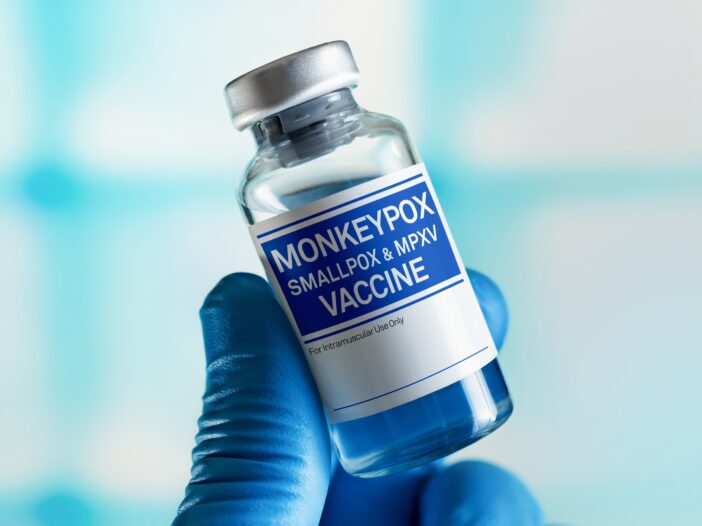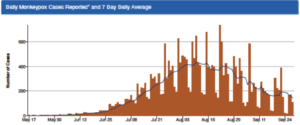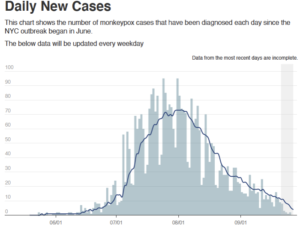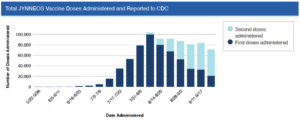
 New MPV diagnoses appear to have stabilized but at a level notably lower than in August: As of September 30, 25,851 people in the U.S. had been diagnosed with MPV. Since early August, the number of new MPV diagnoses has declined nationally, although new diagnoses appear to have stabilized over the last two weeks. California alone accounts for 1 in 5 cumultative MPV diagnoses, followed by New York, Florida and Texas. CDC projects that new cases are likely to continue to decline, but that “low-level transmission could continue indefinitely.”
New MPV diagnoses appear to have stabilized but at a level notably lower than in August: As of September 30, 25,851 people in the U.S. had been diagnosed with MPV. Since early August, the number of new MPV diagnoses has declined nationally, although new diagnoses appear to have stabilized over the last two weeks. California alone accounts for 1 in 5 cumultative MPV diagnoses, followed by New York, Florida and Texas. CDC projects that new cases are likely to continue to decline, but that “low-level transmission could continue indefinitely.” Racial/ethnic disparities persist: Even as the number of new cases has declined, MPV in the U.S. is becoming increasingly concentrated in communities of color. The impact is especially apparent among Black people in the U.S., who account for roughly half of all recent MPV cases.
Racial/ethnic disparities persist: Even as the number of new cases has declined, MPV in the U.S. is becoming increasingly concentrated in communities of color. The impact is especially apparent among Black people in the U.S., who account for roughly half of all recent MPV cases.- Some jurisdictions have experienced especially marked declines: MPV diagnoses have fallen by 95% in California. Likewise, New York City, an early epicenter of MPV in the U.S., has also experienced a substantial decline in new diagnoses (see graph). In Washington D.C., new MPV diagnoses have dropped by 70% in the last month.
- Increased vaccine uptake is helping prevent MPV transmission: As of September 27, 803,596 doses of the JYNNEOS vaccine had been administered nationwide. Demand for the first dose of the vaccine has declined (see graph), while administration of second doses has increased.
 Vaccine demand peaked in early August and has modestly decline since. New data released by CDC last week indicates that the risk of acquiring MPV is 14 times greater among people who had received a first dose of the vaccine at least 2 weeks prior compared to people who were unvaccinated. CDC emphasizes the importance of getting both doses of the JYNEEOS vaccine, as a single dose generates a notably weaker immune response than the full two doses. Last week, the CDC officially expanded eligibility for the MPV vaccine to include not only people previously exposed to the virus but to those who at risk for exposure – this announcement will likely have only limited effect in the real world, as many state and local health departments had already allowed pre-exposure vaccination.
Vaccine demand peaked in early August and has modestly decline since. New data released by CDC last week indicates that the risk of acquiring MPV is 14 times greater among people who had received a first dose of the vaccine at least 2 weeks prior compared to people who were unvaccinated. CDC emphasizes the importance of getting both doses of the JYNEEOS vaccine, as a single dose generates a notably weaker immune response than the full two doses. Last week, the CDC officially expanded eligibility for the MPV vaccine to include not only people previously exposed to the virus but to those who at risk for exposure – this announcement will likely have only limited effect in the real world, as many state and local health departments had already allowed pre-exposure vaccination. - MPV remains a serious disease: Last week, CDC issued a health advisory emphasizing severe symptoms of MPV infection among immune-compromised people, including people living with HIV who have a CD4 count under 200.
- Gay/bisexual men continue to account for the large majority of MPV diagnoses, but more cases are appearing in other populations: A report by the CDC projects that MPV will remain heavily concentrated among gay/bisexual men for the foreseeable future, but cases in other populations are growing. These include MPV diagnoses among children (27 nationwide as of last week) as well as documented, low risks of MPV transmission to health care workers.
- Los Angeles extends protection to workers with MPV: After reports of hardship and job loss associated with MPV-related isolation, the Los Angeles Board of Supervisors last week approve paid sick leave for people diagnosed with MPV.